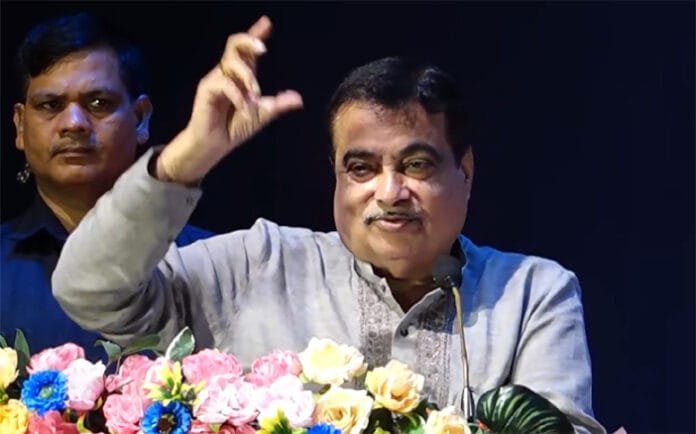Union Minister Nitin Gadkari has once again stirred a nationwide debate with his unfiltered remarks on the inefficiency of government systems and the rampant culture of freebies in Indian politics. Speaking during a program in Nagpur, Maharashtra, Gadkari vented his frustration with government bodies like municipal corporations and the Nagpur Improvement Trust (NIT), branding them as unproductive and obstructive to progress. His comments have gone viral, generating intense political discourse.
Gadkari’s Explosive Statement in Nagpur: What Did He Say?
Addressing a public gathering in Nagpur, Nitin Gadkari expressed dismay over administrative hurdles that cripple developmental initiatives. With a tone of deep frustration, the senior BJP leader declared:
“I had a dream to build 300 stadiums for playing in Nagpur. But after four years, I realized that the government is very useless. No work can be done by relying on corporations or NIT. They have the expertise to puncture a moving vehicle.”
This metaphor—“puncturing a moving vehicle”—sharply criticizes the bureaucratic red tape and sluggishness that stall or derail initiatives, even when they’re already progressing.
A Harsh Reality Check on Government Functioning
Gadkari’s comments reflect a deep-rooted frustration with institutional inertia. By declaring that “the government is very useless,” he did not merely express personal disappointment but unveiled a systemic flaw that resonates with many Indians. The slow pace of approvals, outdated procedures, and lack of accountability continue to obstruct infrastructural growth and urban development across the country.
This criticism gains weight, considering Gadkari’s reputation for efficiency and execution, particularly in the realm of infrastructure and highway development.
Why Nitin Gadkari’s Statement Matters Now
The timing of this statement is significant. As political parties prepare for upcoming state elections and with the Lok Sabha elections on the horizon, public anger against inefficiency and wasteful expenditures is rising. Gadkari’s blunt critique appears to reflect the growing chasm between political vision and administrative delivery.
The fact that a senior Union Minister is making such remarks about government entities suggests internal tensions within the system—a cry for reform from within.
The Freebie Culture in Politics: “There’s a Full Market of Freebies Here”
Apart from slamming administrative bodies, Gadkari also took a swipe at the prevailing culture of political freebies, stating:
“I am in politics. There’s a full market of freebies here. I want everything for free. One should never teach such things.”
This piercing remark attacks the populist policies used to woo voters with free electricity, water, laptops, or even cash incentives. Gadkari’s call to reject this culture highlights the economic unsustainability of freebie politics, which often burdens state finances and stifles real development.
Public Reaction: Viral Video Sparks Debate
The video clip of Gadkari’s speech quickly spread across social media platforms, drawing sharp responses from all quarters. While many praised his honesty and courage to speak the truth, others questioned whether such statements would damage the BJP’s own governance narrative.
Some social media users hailed Gadkari as a rare voice of reason in Indian politics, applauding his focus on long-term development over short-term populism.
Political Ripples: Did Gadkari Target Anyone Specific?
While Gadkari didn’t name any specific individuals or parties, the target of his remarks appears to be government-run development authorities and local corporations in Nagpur. His use of the word “puncture” implies active sabotage or deliberate inefficiency—suggesting internal sabotage or bureaucratic resistance even within the BJP-led administration.
Political observers have speculated whether his comments also reflect internal rifts within the party or dissatisfaction with local governance under BJP’s watch in Maharashtra.
Track Record: Gadkari’s Development Vision vs Ground Realities
As Minister for Road Transport and Highways, Nitin Gadkari is widely credited with accelerating India’s infrastructure growth, particularly in road construction. His frustration seems to stem from a stark contrast between his national achievements and local bureaucratic failure in Nagpur.
His ambition to build 300 sports stadiums aligns with his larger vision of urban development, youth engagement, and public health. The delay and derailment of such an initiative reveal the disconnect between visionary leadership and administrative execution.
Freebie Politics vs Sustainable Growth: A National Crisis?
Gadkari’s disapproval of the freebie culture touches a raw nerve in Indian politics. Parties across the spectrum, from BJP to Congress and AAP, have been accused of using freebies as electoral tools. However, Gadkari’s remarks may mark a turning point in mainstream political criticism of such practices.
He warned that teaching people to demand everything for free discourages work ethic, innovation, and self-reliance. This statement comes amidst increasing public discourse on whether India can afford populism in the face of pressing development needs like education, employment, and infrastructure.
Inside BJP: A Lone Voice or the Start of Something Bigger?
Though Gadkari’s comments appear as an individual outburst, they may signal broader ideological discomfort within parts of the BJP. Known for his technocratic, results-oriented approach, Gadkari often distances himself from political rhetoric and emphasizes governance, innovation, and delivery.
His criticism may prompt a re-evaluation of how the BJP manages its development agenda, especially in urban areas where bureaucratic inertia and red tape are deeply entrenched.
The Way Forward: Reform or Resentment?
Gadkari’s speech lays bare the challenges India faces in transforming policy into reality. His message is clear: Visionary ideas must not be left at the mercy of outdated, obstructive administrative systems.
If India wants to rise as a true global power, it must:
Streamline bureaucracy with performance-based accountability
Discourage unsustainable political freebies
Empower competent institutions with autonomy and responsibility
Promote a culture of delivery over dependency
Conclusion: A Wake-Up Call from Within the System
Nitin Gadkari’s candid critique of government inefficiency and freebie politics is more than a personal grievance—it is a powerful wake-up call for Indian governance. By openly acknowledging that “the government is very useless” in certain areas, he has voiced what countless citizens experience daily.
This viral statement may become a catalyst for change—if it pushes both policymakers and the public to demand more accountability, transparency, and results from those in power.
Let this not be another viral moment forgotten tomorrow. Let it ignite a deeper conversation on what real governance should look like in 21st-century India.












